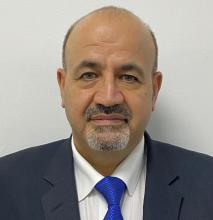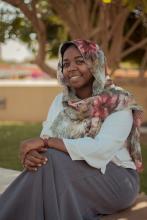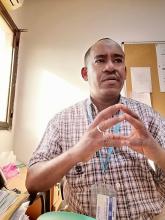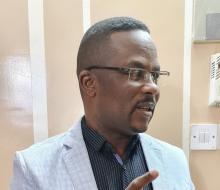Many communities in Darfur are, for the first time, sitting down with local health authorities and partners in a series of community health dialogues to discuss priorities and find solutions to the problems the health system faces.
Community engagement is a crucial part of ensuring equity and health for all. Many people and communities in Sudan are vulnerable, particularly as many local health facilities were destroyed or damaged during the war.
Communities are setting their own health priorities and are finding solutions to their local problems as they work closely with local health authorities; including re-instigating health committees and supporting local health workers.
WHO, through the UHC Partnership, is working hand in hand with the Ministry of Health, local health authorities and other partners to institutionalize community engagement in the primary health care based health system, crucial in moving towards universal health coverage and peace.

“Local communities know their priorities, therefore, it is important to engage them in the planning of health interventions to ensure ownership and full participation.”

"The bottom-up approach is important to strengthen community engagement and to enable our societies to be part of the decision-making process. The community’s role is a cornerstone towards attaining universal health coverage in Sudan."

“Enhancing community engagement is a crucial element for building resilient local health and community systems to respond to the needs of the population, particularly underserved and disadvantaged groups such as IDPs, returnees and rural communities. Our experience in institutionalizing the community health dialogues proved that local communities could contribute to addressing health system bottlenecks. For example, the inequitable distribution of frontline health workforce is being addressed by providing retention packages.”

“Community health dialogues are a very powerful tool towards community stabilization and empowerment to address root causes of violence and instability in Darfur and other parts of the country. This approach is very much in line with the mandate of the African Union United Nations Hybrid Operation in Darfur (UNAMID).”
THE LONG READ
When violence erupted in Darfur in 2004, Bahja Ahmed and her five young children were forced to leave their village. They had spent 12 years living in a camp for internally displaced people (IDPs) in North Darfur State and returned to their home village in 2018 following the signing of the Doha Peace Agreement.
“We returned to our homeland with hope to regain what we lost during the conflict and displacement, but unfortunately we lack basic services. Our health centre was also destroyed during the war,” said Bahja.
To obtain health care, she had to travel long distances by lorry or donkey to the nearest city and pay for services. She often could not afford it.
“The only option for me was to use traditional and herbal medicines,” she said.
WHO, through the UHC Partnership, underscores that supporting vulnerable communities in a post-conflict environment requires a meaningful and community-driven approach to find pragmatic and workable solutions. Working in close collaboration with the Ministry of Health and local health authorities, WHO has established a process to actively involve communities in improving local health services. Through regular participatory meetings between communities and local health authorities, people like Bahja and their families are now able to identify their health needs and priorities and support concrete steps to rebuild and improve services.
“This is the first time for somebody to visit us to discuss our health issues since our return. The dialogue with local officials provided a platform for us to discuss our health issues and activate the village health committee which had not meet for long time,” said El Omda Adam, a community leader in Bahja’s village, Darfur.


Health equity means leaving no one behind
Community engagement is an important and integral process for any health system development effort, especially to improve health equity and achieve universal health coverage (UHC). Pursuing health equity means striving for the highest possible standard of health for all people and giving special attention to the needs of those who are at the highest risk of poor health, because of their low socioeconomic conditions.
Sudan’s Darfur region has faced many difficulties over the past decades, with its population suffering from the devastating impact of the war leading to death, disease and displacement for millions. Now, many people who previously fled to IDP camps are returning to their home villages. They arrive back to find little infrastructure remaining, and extremely limited health services available.
“The bottom-up approach is important to strengthen community engagement and to enable our societies to be part of the decision-making process. The community’s role is a cornerstone towards attaining universal health coverage in Sudan,” said Dr Arwa Gaddal, Director of states support and local health system strengthening Department, Federal Ministry of Health.

FEATURED VIDEO: Community dialogues pave the way to health and peace for all
Poor social, economic and environmental conditions of these vulnerable and disadvantaged populations demand an urgent and effective response. WHO, through the UHC Partnership, has since late 2018, worked closely with the Ministry of Health, local health authorities and other partners and communities to bring people to build a healthier life for everyone in Sudan.
Community health dialogues bring together communities, local authorities, local health partners such as non-government organizations and community-based organizations to discuss health priorities and concerns, and envisage a way to prioritize and plan for better health outcomes.
“Local communities know their priorities, therefore, it is important to engage them in the planning of health interventions to ensure ownership and full participation,” said Dr Ni’ma Saeed Abid, WHO Representative in Sudan.
Sudan is among the 115 countries and areas to which the UHC Partnership helps deliver WHO support and technical expertise in advancing UHC with a primary health care approach. The Partnership is funded by the European Union (EU), the Grand Duchy of Luxembourg, Irish Aid, the Government of Japan, the French Ministry for Europe and Foreign Affairs, the United Kingdom – Foreign, Commonwealth & Development Office and Belgium.

Community engagement helps improve health outcomes
In West Darfur, a team from WHO, the Ministry of Health, the local health authority and the United Nations African Union Hybrid Operation in Darfur (UNAMID) visited four communities living in Kreinik, Mornie, Serba and ElGeneina in November 2020. The team held several in-depth discussions with each community and was guided by a questionnaire to identify gaps in the health services including promotive, preventive, curative, rehabilitative and palliative health care.
The community engagement approach has proven to be sustainable. It has been institutionalized through the local health authorities which now have greater capacities to regularly engage with local communities in setting the health agenda and monitoring implementation.
“Enhancing community engagement is a crucial element for building resilient local health and community systems to respond to the needs of the population, particularly underserved and disadvantaged groups such as IDPs, returnees and rural communities. Our experience in institutionalizing the community health dialogues proved that local communities could contribute to addressing health system bottlenecks. For example, the inequitable distribution of frontline health workforce is being addressed by providing retention packages,” said Dr Imadeldin Ismail, Coordinator UHC/Health Systems Strengthening Unit, WHO Country Office in Sudan.

In all communities, the team and the community members discussed health challenges, epidemics and crises in the area, as well as the response and performance of the health team and coordination mechanisms. The communities made suggestions to improve the performance of the health team. In turn, the health team proposed what the community could do to contribute to better health outcomes in the locality.
The meetings concluded with a summary of community recommendations to be implemented and monitored, some of which were instigated and supported by the communities themselves. For example, one of the main barriers to accessing health services is the lack of health workers in rural areas, often due to poor retention. Some communities, as a result of community dialogues, created incentives for health workers to stay and work locally, such as giving them housing, water and agricultural land.
“Community health dialogues are a very powerful tool towards community stabilization and empowerment to address root causes of violence and instability in Darfur and other parts of the country. This approach is very much in line with the mandate of the African Union United Nations Hybrid Operation in Darfur (UNAMID),” said Ezzedin Adam, Community Stabilization Officer, UNAMID.

Health empowerment in the Durti community
The Durti community in El Geneina is a strong example of health empowerment. The community identified several key issues: medicine shortages, environmental problems due to the manufacturing of bricks in residential areas, stagnant water everywhere, which contributes to the spread of tropical diseases such as malaria, open defecation, lack of drinking water, maternal and childhood health issues, and kidney problems among others. There are no public health or nutrition health workers in the area. While the community participated in cleaning campaigns and sensitization visits to houses, they had never been engaged in identifying their own health priorities or taken part in planning. Although the health committee existed, it had never been active.
With future funding and support, this community engagement process will be replicated in ten other states in Sudan. The dialogues and subsequent action will further promote health equity, and support Sudan in accelerating the achievement of UHC as it rebuilds and simultaneously tackles COVID-19—its current major health challenge.

Responding to COVID-19
The COVID-19 crisis has exacerbated existing vulnerabilities in the population and further compromises Sudan’s efforts to build its democracy, economy and other systems including the health system. Health services are already overstretched and risk collapse. Water and sanitation coverage is poor, and approximately three million children remain out of school. Sudan has simultaneously battled outbreaks of diphtheria, malaria, chikungunya and polio from January to October 2020. The pandemic adds to the challenges of internal conflicts, political instability, economic crisis, climate change, natural disasters, disease outbreaks and gaps in basic service provision.
Sudan had its first community-acquired case of COVID-19 in March 2020, and the government announced a national health emergency. WHO worked to enhance coordination mechanisms with health partners, bringing in development partners and the humanitarian cluster to draw and mobilize resources to support the national COVID-19 response plan. The European Commission was a strong supporter of the humanitarian-development nexus, to strengthen the health system to respond to the pandemic, and the UHC Partnership has played a key role to engage partners and ensure a strong national response to COVID-19.
Sudan has faced several concurrent health emergencies and outbreaks in the past few years including dengue fever, chikungunya, rift valley fever, diphtheria, measles and circulating vaccine-derived polioviruses. Sudan organized the Joint External Evaluation (JEE) in 2016, and gaps identified by the JEE were translated in to the Sudan National Action Plan for health security (NAPHS). As part of the monitoring framework of International Health Regulations (2005), Sudan successfully conducted reviews for several declared public health events including Rift Valley fever, cholera and COVID-19. Several international actors (Italian Corporation, EU, Germany and Norway) are supporting Sudan to improve core capacities required by the IHR (2005) but still the NAPHS is highly underfunded.

Health equity is fundamental for UHC
The experience of community engagement in Sudan shows how empowering communities helps them to identify and prioritize their health needs and the issues that make it harder for people to live healthy lives and obtain the health care they need. Community dialogues provide the space and opportunity for communities to speak up, take responsibility for their health, to hold local health authorities and teams accountable, and to act as an early warning system in times of crisis.
